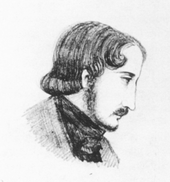Theodor Althaus

Theodor Althaus (born October 26, 1822 in Detmold , † April 2, 1852 in Gotha ) was a German theologian and writer .
Life
The son of the Lippe superintendent Georg Friedrich Althaus and grandson of the Magdeburg general superintendent and bishop Bernhard Dräsecke attended the Leopoldinum grammar school in Detmold from 1831 to October 1840 and then studied Protestant theology at the universities of Bonn and Jena from 1840 to 1843 , with Gottfried Kinkel , among others also history with Friedrich Christoph Dahlmann . In 1841 he became a member of the fraternity at the Fürstenkeller Jena and in 1842 of the Fridericia Bonn fraternity . After completing his studies, he went to Berlin, where he socialized with Bettina von Arnim and Henriette Herz . In 1844 he worked for the free-thinking " Weser-Zeitung ", and in 1847 for the " Saxon Fatherland Papers " in Leipzig , which became known throughout Germany through the editor and founder of German Catholicism Robert Blum . Althaus had a close friendship with Malwida von Meysenbug , to whom he was engaged at times and whose "association for the poor" he actively supported. After he ran unsuccessfully for the Frankfurt National Assembly in Lippe , he went to Frankfurt in 1848 as a correspondent for the “ Bremer Zeitung ” to report on the negotiations of the Frankfurt National Assembly in the Paulskirche . He became editor of this democratic newspaper, which he soon published under the name " Zeitung für Norddeutschland " in Hanover . In 1849 he was sentenced to one year in prison for inciting high treason. After his release, Malwida von Meysenbug brought him to the university for women in the Free Religious Community of Hamburg as a lecturer . The authorities expelled him after four weeks. On April 2, 1852, he died of leukemia in Gotha , where he was taking a cure.
Works
- A trip to the Rhine in August. Dedicated to the people of Cologne, Schleswig-Holstein and everyone who loves the Rhine. 1846
- The future of Christianity. His truth, his perversion and his rebirth through freedom and love. 1847
- World history for the youth. 1848
- From prison. German memories and ideals. 1850 ( LLB Detmold )
literature
- Renate Hupfeld: Theodor Althaus - Revolutionary in Germany. 2011, ISBN 978-3-942594-17-2
- Dora Wegele: Theodor Althaus and Malwida von Meysenbug. 1927
- Malwida von Meysenbug : Memoirs of an Idealist. 2 volumes.
- Eckhart Pilick: Theodor Althaus. In: Lexicon of Free Religious Persons. Pp. 9-10. Rohrbach / Pfalz oJ, ISBN 3-930760-11-8 .
- Helge Dvorak: Biographical Lexicon of the German Burschenschaft. Volume I Politicians, Part 1: A – E. Heidelberg 1996, pp. 16-17. (with silhouette)
- Friedrich Althaus: Theodor Althaus. A picture of life . Emil Strauss, Bonn 1888.
- Ferdinand Frensdorff : Althaus, Theodor . In: Allgemeine Deutsche Biographie (ADB). Volume 1, Duncker & Humblot, Leipzig 1875, p. 366 f.
- Heinz Gollwitzer : Althaus, Theodor. In: New German Biography (NDB). Volume 1, Duncker & Humblot, Berlin 1953, ISBN 3-428-00182-6 , p. 221 ( digitized version ).
Web links
- Literature by and about Theodor Althaus in the catalog of the German National Library
- Theodor Althaus in the Lexicon of Westphalian Authors
- Theodor Althaus private page
- Curriculum vitae on the Grabbe Society's website
Individual evidence
- ↑ Hanns-Peter Fink: Leopoldinum - Gymnasium zu Detmold 1602–2002 (= special publications of the Natural Science and Historical Association for the Land of Lippe . Volume 64 ). Aisthesis Verlag, Bielefeld 2002, ISBN 3-89528-365-7 , p. 270 .
- ^ Helge Dvorak: Biographical Lexicon of the German Burschenschaft. Volume I Politicians, Part 1: AE. Heidelberg 1996, p. 16.
- ↑ Renate Hupfeld: Theodor Althaus and the year 1848 , 2011, accessed on April 30, 2012
| personal data | |
|---|---|
| SURNAME | Althaus, Theodor |
| BRIEF DESCRIPTION | German journalist and theologian |
| DATE OF BIRTH | October 26, 1822 |
| PLACE OF BIRTH | Detmold |
| DATE OF DEATH | April 2, 1852 |
| Place of death | Gotha |